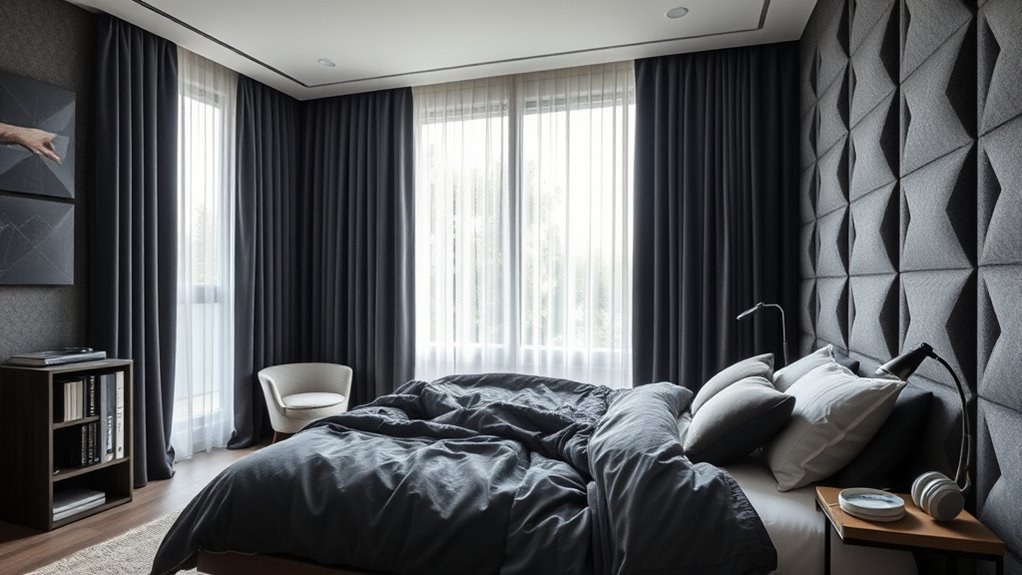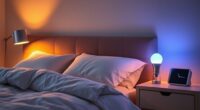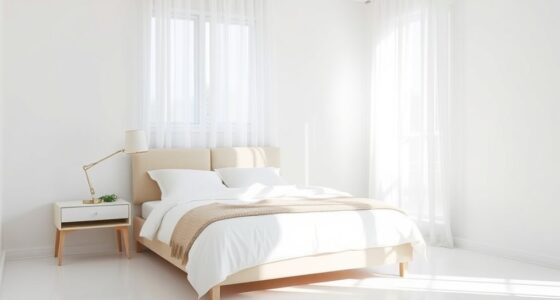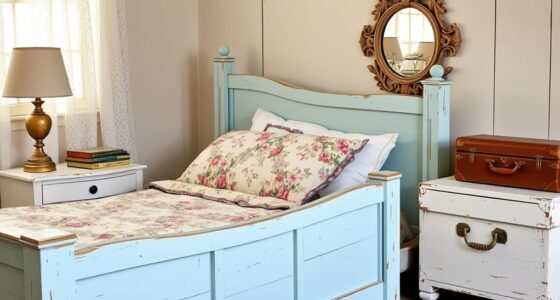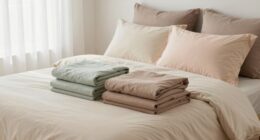To soundproof your bedroom, start by sealing gaps around windows and doors with weatherstripping or caulking. Add heavy curtains and plush rugs to absorb noise, and consider installing acoustic panels on walls for extra insulation. Reinforce doors with soundproofing materials or replace them with solid-core options. Combining these steps can markedly reduce unwanted sound, creating a calmer space. Keep exploring these tips to discover more effective ways to achieve a peaceful bedroom sanctuary.
Key Takeaways
- Seal gaps around windows and doors with weatherstripping or caulk to prevent outside noise entry.
- Add acoustic panels or wall hangings to absorb sound reflections and reduce echo.
- Use thick curtains, rugs, and soft furnishings to dampen noise and minimize sound transmission.
- Install soundproof doors or upgrade existing doors for better insulation against noise.
- Introduce white noise machines or fans to mask background sounds and create a peaceful environment.

MAXTID Large Door Draft Stopper for Bottom of Doors 36” Under Door Sweep Noise Blocker Black Gap Stoppers Adjustable Doors Seal Sweep Guard Draft, Window Breeze Stoppers, Home Essentials Gadgets
Large door draft stopper foam is 2 inches in diameter, which is larger than most sellers' foam and…
As an affiliate, we earn on qualifying purchases.
As an affiliate, we earn on qualifying purchases.
Assessing Your Room’s Noise Sources and Weak Points
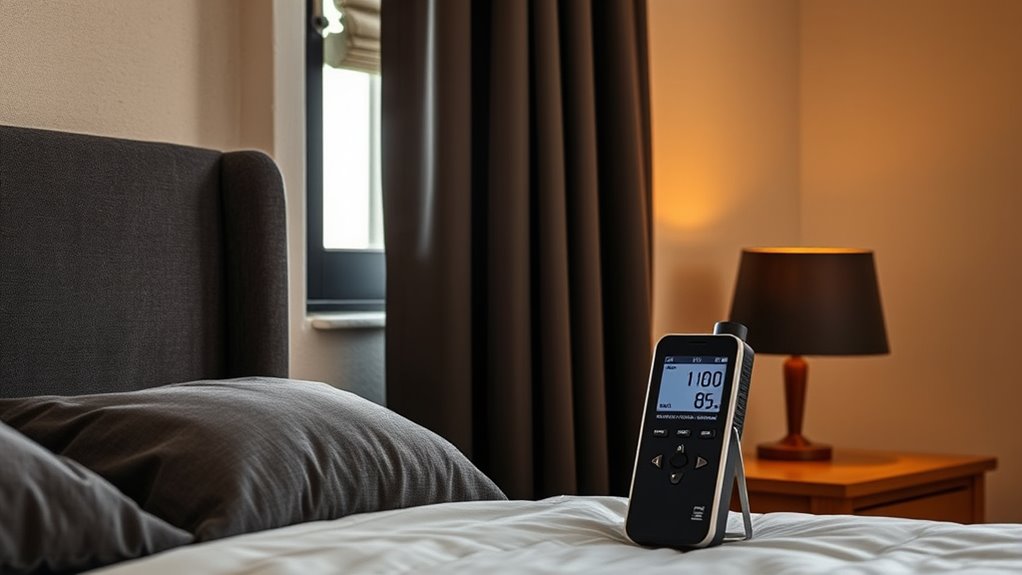
Before you can effectively soundproof your bedroom, you need to identify where the most noise is coming from and which areas are most vulnerable. Start by listening carefully during different times of the day to detect persistent issues like window leaks or ceiling noise. Window leaks can allow outside sounds to enter easily, so check for gaps around your windows and consider sealing them with weatherstripping or caulking. Ceiling noise, often caused by upstairs activity or plumbing, can be distracting; identify if vibrations or airborne sounds are the main problem. Once you pinpoint these weak spots, you can target your soundproofing efforts more effectively. Understanding the primary noise sources and vulnerable areas sets a solid foundation for reducing unwanted sound in your bedroom. Incorporating soundproofing materials such as acoustic panels or mass-loaded vinyl can further enhance your efforts.

Focusound 52 Pack Acoustic Foam Panels 1" x 12" x 12" Sound Proof Foam Panles Soundproofing Noise Cancelling Wedge Panels for Home Office Recoding Studio with 300PCS Double-Side Adhesive
Soundproofing – Acoustic foam panels triangular grooves structure for better noise absorption, helps to reduce and absorb unwanted…
As an affiliate, we earn on qualifying purchases.
As an affiliate, we earn on qualifying purchases.
Enhancing Walls and Doors for Better Sound Absorption

To improve your bedroom’s soundproofing, focus on enhancing your walls and doors to better absorb sound. Start by adding wall panels that reduce echo and block noise transmission. Seal gaps around your door with high-quality door seals to prevent sound leaks. Consider installing thicker or soundproof doors for extra insulation. Using acoustic caulk around edges and joints can further improve sound absorption. Upgrading your door hardware and adding weatherstripping can make a noticeable difference. For walls, attaching foam panels or fabric-wrapped panels effectively dampens sound waves. Additionally, incorporating self-watering plant pots can help improve the room’s humidity and overall environment, contributing to a more peaceful atmosphere. These simple enhancements create a quieter oasis, transforming your space into a peaceful retreat.
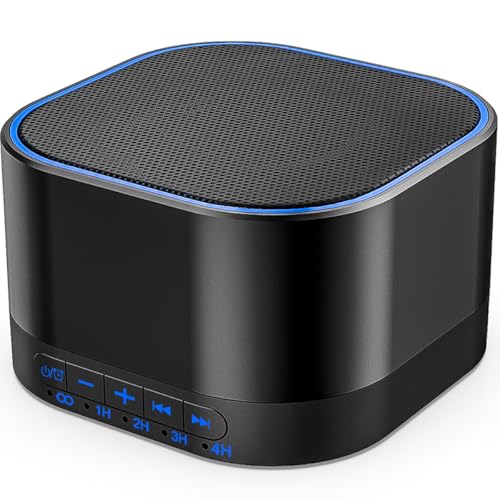
Magicteam White Noise Machine with 20 Non Looping Natural Soothing Sounds Memory Function 32 Levels of Volume Powered by AC or USB and Sleep Sound Timer Therapy for Baby Kids Adults Black
❤20 Non-Looping Sleep Sounds: White noise ,Brown noise, pink noise, blue noise, fan,brook, rain, ocean,bird and Bonfire,suitable for…
As an affiliate, we earn on qualifying purchases.
As an affiliate, we earn on qualifying purchases.
Utilizing Soft Furnishings and Decor to Dampen Sound
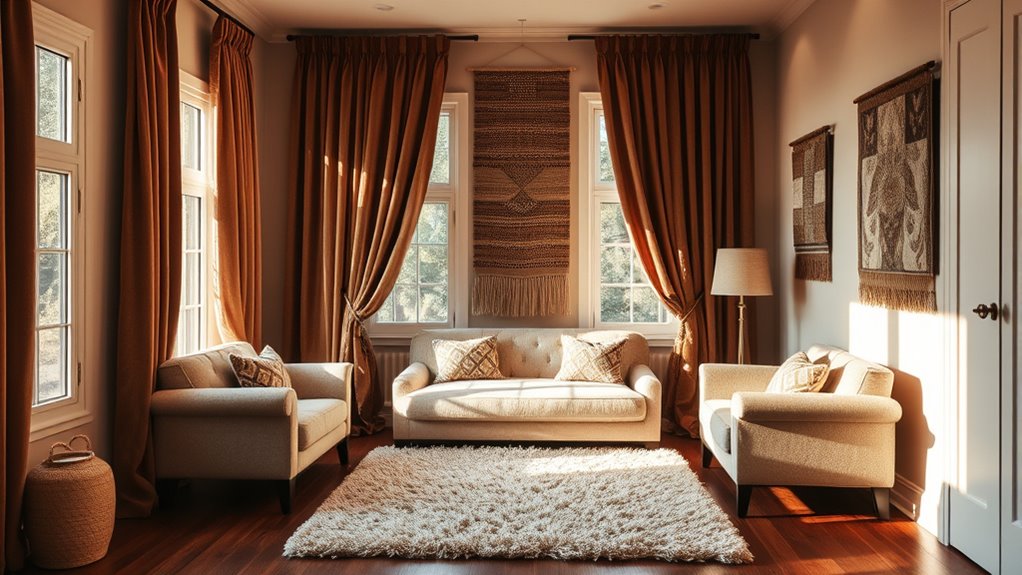
Soft furnishings and decor play a crucial role in absorbing sound and reducing noise in your bedroom. Decorative curtains, especially thick or layered ones, help block sound from outside and prevent interior noise from bouncing around. Plush rugs add mass to the floor, dampening footsteps and other impact sounds. These elements also create a cozy atmosphere that naturally absorbs excess noise, making your space quieter. Placing soft furnishings strategically around the room minimizes sound reflections and echoes. Combining decorative curtains with plush rugs enhances the overall acoustic environment without sacrificing style. Keep in mind that the more textiles and soft surfaces you introduce, the better your bedroom will be at dampening unwanted sound, creating a peaceful, restful sanctuary. Incorporating anti-noise elements can further improve soundproofing and ensure a more tranquil environment.

Yakamok 100% Blackout Curtains 84 Inches Long, 2 Thick Layers Heat and Full Light Blocking Soft Thermal Insulated Drapes for Bedroom(52" Wide Each Panel, Grey, 2 Panels)
PACKAGE MADE:2 panels per package. Each Lined Curtain measures 52" wide x 84" long. 8 Silvery Grommets per…
As an affiliate, we earn on qualifying purchases.
As an affiliate, we earn on qualifying purchases.
Installing Soundproofing Materials and Barriers
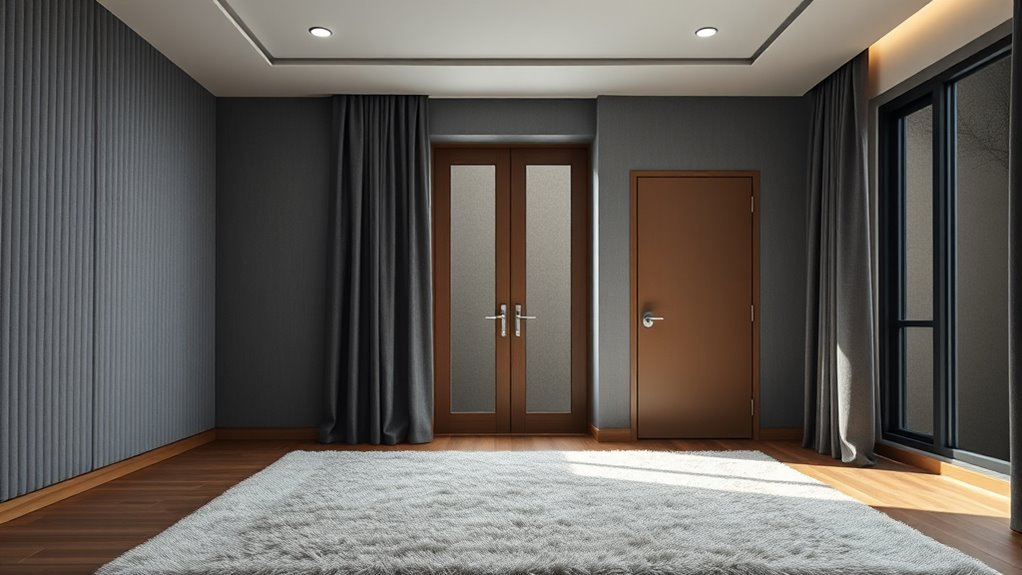
Building on your soft furnishings, installing soundproofing materials and barriers can considerably improve noise reduction. You can start by hanging soundproof curtains, which block out external noise and add a cozy vibe. Acoustic panels mounted on walls absorb sound waves, transforming your space into a peaceful retreat. Consider sealing gaps around windows and doors with weatherstripping to prevent sound leaks. Adding mass-loaded vinyl barriers behind walls can further dampen noise transmission. These steps make your bedroom a sanctuary of calm and privacy, giving you better rest and relaxation. Additionally, ensuring proper sound insulation within your walls can significantly enhance overall noise reduction.
- Feel the weight of peace as noise fades away
- Experience serenity with every sound blocked
- Embrace comfort in a quieter, calmer space
- Reclaim your nights from intrusive noise
- Create a haven where tranquility reigns
Additional Tips for Maintaining a Quiet and Calm Environment

Maintaining a quiet and calm environment requires consistent habits and mindful choices. One effective tip is to use earplugs when needed, especially during noisy nights or busy days, to block out disruptive sounds. Keep a pair nearby so you can easily insert them when necessary. Additionally, introducing white noise can mask irregular sounds that disturb your sleep or relaxation. A white noise machine or even a fan can create a steady background sound, promoting tranquility. Establishing a calming bedtime routine, like turning off electronic devices and dimming lights, also helps reinforce a peaceful atmosphere. Regularly maintaining these habits ensures your environment stays serene, making it easier to rest and unwind. Small, consistent actions can considerably enhance your bedroom’s quiet and calming vibe. Incorporating soundproofing techniques can further optimize your space for relaxation and sleep.
Frequently Asked Questions
Can Window Treatments Effectively Block Outside Noise?
Window treatments can help block outside noise, especially if you choose the right window coverings and curtain thickness. Thick, layered curtains made from heavy fabrics are more effective at absorbing sound than thin ones. You should opt for window coverings that fit snugly against your windows to prevent gaps where noise can sneak in. While they won’t completely soundproof your room, they definitely reduce a lot of unwanted outside noise.
How Do HVAC Systems Influence Bedroom Soundproofing?
HVAC systems can considerably impact your bedroom’s soundproofing. If your system produces HVAC noise or ventilation noise, it can disrupt your peace and sleep. To minimize this, you might consider upgrading to quieter models, installing vibration pads, or adding soundproof insulation around vents. Regular maintenance also helps reduce noise. These steps ensure your HVAC system doesn’t compromise your bedroom’s tranquility, making your space more restful.
Are There Eco-Friendly Soundproofing Options?
You can choose eco-friendly soundproofing options by using recyclable materials and natural insulators. Materials like recycled denim, sheep’s wool, or cellulose insulation are effective and environmentally friendly. These options not only reduce your carbon footprint but also provide excellent sound absorption. By selecting natural insulators, you create a quieter space without relying on synthetic or harmful substances, making your bedroom both peaceful and eco-conscious.
What Role Do Electrical Outlets Play in Sound Leakage?
Did you know that electrical outlets are responsible for up to 20% of sound leakage in rooms? You can reduce this by sealing gaps around outlet covers and installing soundproof outlet covers. Electrical wiring inside the walls can also transmit noise, so adding insulation behind outlets helps block sound. Using outlet covers and sealing gaps creates a barrier, making your bedroom quieter and more peaceful.
How Often Should Soundproofing Materials Be Maintained or Replaced?
You should schedule regular soundproofing inspections every 1-2 years to catch any material deterioration early. Over time, soundproofing materials can wear down, lose effectiveness, or become damaged, so maintaining them guarantees peak performance. If you notice increased noise or visible wear, it’s time to replace or upgrade your soundproofing. Regular maintenance helps preserve your privacy and the quiet environment you want in your bedroom.
Conclusion
By applying these soundproofing tips, you can transform your bedroom into a peaceful retreat. For example, imagine adding heavy curtains and sealing gaps around your door—suddenly, outside noise diminishes markedly. With a few simple upgrades, like soft furnishings or acoustic panels, you’ll create a calm environment perfect for rest or work. Keep experimenting with these tricks, and you’ll enjoy a quieter, more comfortable space tailored to your needs.
